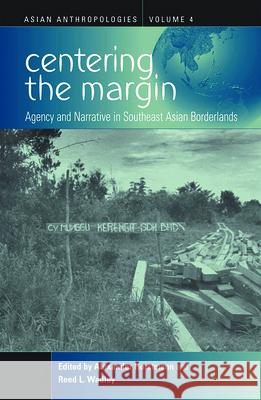Centering the Margin: Agency and Narrative in Southeast Asian Borderlands » książka
Centering the Margin: Agency and Narrative in Southeast Asian Borderlands
ISBN-13: 9781845455910 / Angielski / Miękka / 2008 / 248 str.
Centering the Margin: Agency and Narrative in Southeast Asian Borderlands
ISBN-13: 9781845455910 / Angielski / Miękka / 2008 / 248 str.
(netto: 130,37 VAT: 5%)
Najniższa cena z 30 dni: 135,22
ok. 30 dni roboczych.
Darmowa dostawa!
..".an excellent collection that should be read by all scholars of Southeast Asia, and that should provoke more thought and research on the people whose lives and practicescontinue to connect Southeast Asian nation-states." - JRAI "The literature on borders and borderlands, the state, globalization and ethnic minorities, is now huge, but the editors of this book do a good job of summarizing most of it in their introduction...This book... will swiftly become a key reading in university courses dealing with borderlands and Southeast Asia." - Bijdragen tot de Taal-, Land- en Volkenkunde ..".each of the studies is well worth making available and the set of them offers a useful addition to the literature on borders and migration." - Anthropos In a completely new approach to borders and border crossing, this volume suggests a re-conceptualization of the nation in Southeast Asia. Choosing an actor approach, the individual chapters in this volume capture the narratives of minorities, migrants and refugees who inhabit and cross borders as part of their everyday life. They show that people are not only constrained by borders; the crossing of borders also opens up new options of agency. Making active use of these, border-crossing actors construct their own live projects on the border in multiple ways against the original intention of the nation-state. Based on their intimate knowledge of the interaction of communities, anthropologists from Europe, the USA, Japan and Southeast Asia provide a vivid picture of the effects of state policies at the borders on these communities. Alexander Horstmann teaches Social Anthropology of Southeast Asia at the University of Munster and is a Fellow of the Study Group Islamic Culture - Modern Society at the Institute of Advanced Study in the Humanities (Kulturwissenschaftliches Institut), Essen. Among his major publications include Class Culture and Space: The Construction and Shaping of Communal Space in South Thailand, Transaction, 2002. Reed L. Wadley is Assistant Professor of Anthropology, University of Missouri, USA. His research includes borderlands, warfare, colonialism, natural resource management and historical ecology, involving Iban communities of West Kalimantan, Indonesia. Among his publications are Punitive expeditions and divine revenge: Oral and colonial histories of rebellion and pacification in western Borneo, 1886-1902, Ethnohistory (2004).
“…an excellent collection that should be read by all scholars of Southeast Asia, and that should provoke more thought and research on the people whose lives and practicescontinue to connect Southeast Asian nation-states.” · JRAI“The literature on borders and borderlands, the state, globalization and ethnic minorities, is now huge, but the editors of this book do a good job of summarizing most of it in their introduction...This book… will swiftly become a key reading in university courses dealing with borderlands and Southeast Asia.” · Bijdragen tot de Taal-, Land- en Volkenkunde“…each of the studies is well worth making available and the set of them offers a useful addition to the literature on borders and migration.” · AnthroposIn a completely new approach to borders and border crossing, this volume suggests a re-conceptualization of the nation in Southeast Asia. Choosing an actor approach, the individual chapters in this volume capture the narratives of minorities, migrants and refugees who inhabit and cross borders as part of their everyday life. They show that people are not only constrained by borders; the crossing of borders also opens up new options of agency. Making active use of these, border-crossing actors construct their own live projects on the border in multiple ways against the original intention of the nation-state. Based on their intimate knowledge of the interaction of communities, anthropologists from Europe, the USA, Japan and Southeast Asia provide a vivid picture of the effects of state policies at the borders on these communities.Alexander Horstmann teaches Social Anthropology of Southeast Asia at the University of Münster and is a Fellow of the Study Group Islamic Culture – Modern Society at the Institute of Advanced Study in the Humanities (Kulturwissenschaftliches Institut), Essen. Among his major publications include Class Culture and Space: The Construction and Shaping of Communal Space in South Thailand, Transaction, 2002.Reed L. Wadley is Assistant Professor of Anthropology, University of Missouri, USA. His research includes borderlands, warfare, colonialism, natural resource management and historical ecology, involving Iban communities of West Kalimantan, Indonesia. Among his publications are Punitive expeditions and divine revenge: Oral and colonial histories of rebellion and pacification in western Borneo, 1886-1902, Ethnohistory (2004).











